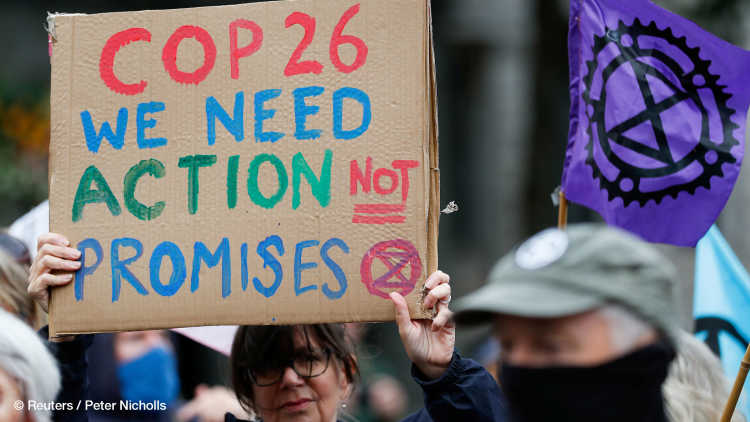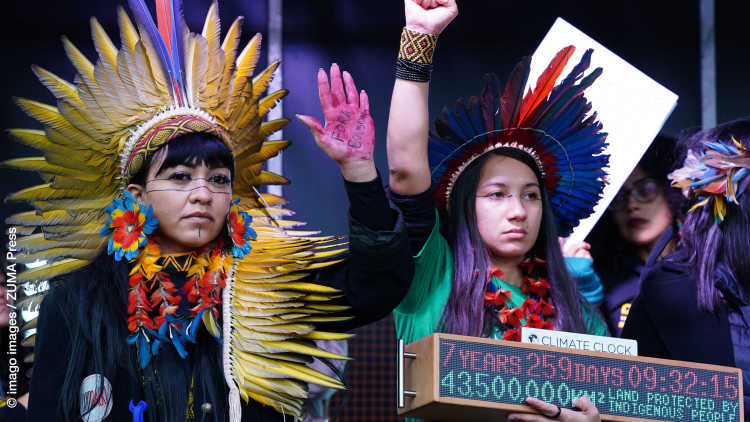- Startseite
- Publikationen
- GIGA Focus
- Brazil First, Climate Last: Bolsonaro's Foreign Policy
GIGA Focus Lateinamerika
Bolsonaros Außenpolitik: Gegen Multilateralismus, für Klimawandel
Nummer 5 | 2019 | ISSN: 1862-3573

Im September 2019 wird Außenminister Heiko Maas bei den Vereinten Nationen (VN) die Allianz für Multilateralismus verkünden. Der brasilianische Präsident Jair Bolsonaro nennt die VN eine nutzlose Institution. Seit der Rechtsextremist im Januar 2019 sein Amt antrat, könnten deutsche und brasilianische Positionen bei globalen Herausforderungen wie Klimawandel, Migration und Menschenrechten kaum unterschiedlicher sein. Bolsonaros verbales Anfachen der Brandrodungen in Amazonien ist nur die Spitze des Eisbergs. Die deutsch-brasilianischen Beziehungen sind in der tiefsten Krise seit der brasilianischen Militärdiktatur.
Ähnlich wie der populistische Modus operandi von US-Präsident Donald Trump, zielt Bolsonaros Außenpolitik vornehmlich auf die eigene Wählerbasis und politische Klientel. Innenpolitische Interessen sind wichtiger als globale Verantwortung und Regenwaldschutz. Der brasilianische Außenminister Ernesto Araújo nennt den Klimawandel eine kommunistische Verschwörung.
Traditionelle Prinzipien der brasilianischen Diplomatie wie der demokratische Multilateralismus sind ins Hintertreffen geraten. Vorderstes Ziel ist die nationale Entwicklung in den Bereichen Technologie, Infrastruktur und Handel. Die weltweit führende Agrarindustrie ist ein Schlüsselsektor in dieser Entwicklungsstrategie.
Bolsonaros Wahlversprechen, die brasilianische Botschaft in Israel nach Jerusalem zu verlegen, war an die mächtige Lobby der Evangelikalen gerichtet. Dagegen warnten die Generäle in Bolsonaros Kabinett davor, dass Brasilien ins Visier des islamistischen Terrorismus geraten könne, während die liberale Agrarlobby um ihre Märkte im Nahen und Mittleren Osten fürchtete.
Die künftige Außenpolitik Brasiliens wird in hohem Maße vom Ausgang des Machtkampfes zwischen Wirtschaftsliberalen, religiösen Ideologen und dem Militär innerhalb der Regierung abhängen. Fest steht, dass sich Brasilien von einem Anwalt für Menschenrechte in einen Staat verwandelt hat, der die Rechte indigener Völker, der LGBT-Gemeinschaft und anderer Minderheiten mit Füßen tritt.
Fazit
Gemeinsame Ziele Brasiliens und Deutschlands beschränken sich auf die friedliche Redemokratisierung Venezuelas und Soft Balancing gegen Chinas Neue Seidenstraße. Brasilien ist dabei sich in eine illiberale Demokratie zu wandeln. Deutschland und Europa sollten beginnen, ihr wirtschaftliches Gewicht in die Waagschale zu legen, um sich mit Brasiliens Minderheiten und Menschenrechtlern zu solidarisieren. Das EU-Mercosur-Abkommen bietet den Europäern zahlreiche Optionen, bindende und verifizierbare Umwelt- und Menschenrechtsstandards festzuschreiben, deren Bruch automatisch Einfuhrstopps für Agrarprodukte nach sich ziehen sollte.
Sources of Bolsonaro’s Foreign Policy
Bolsonaro’s foreign policy platform draws from three main sources. The first, and perhaps most popularly appealing, is the general anti–Workers’ Party (PT) sentiment that had taken over a significant proportion of the Brazilian middle class. According to the far-right candidate’s narrative, as presented in his campaign platform, PT’s South–South strategy was in fact a global alliance between Brazil and murderous dictators, to whom the former presidents had handed over the country’s wealth. An offshoot of this thinking was the often-repeated threat that Brazil would become “a second Venezuela” – in reference to its neighbour’s political, social, and economic breakdown – if the PT won re-election.
Brazil is shifting its priorities towards countries that can offer trade or technological benefits, particularly democracies such as the United States, Italy, and Israel (Bolsonaro 2018). For one thing, Israel speaks directly to the theological beliefs of the ever-growing evangelical Christian community in Brazil, which can be considered the second source of Bolsonaro’s foreign policy promises. Brazilian Pentecostals have progressively adhered to dispensationalist theology, which elevates Israel – and also the recognition of Jerusalem, as its “complete and united” capital.
Anti-globalism is the third – and least understood – source of Bolsonaro’s foreign policy platform. It is often mistaken for nationalism or conservatism, but it is grounded in a broader, nearly conspiratorial, theory that suggests the West has been taken over by globalist forces. Globalism, according to this strand of thought, is an ideology that seeks the construction of a “global, opaque, and highly centralised bureaucratic apparatus” (Martins 2018) to control populations by rooting them out of their core values, particularly the ones related to God, nation, and the family. This apparatus is usually identified with the United Nations and its subsidiary organs, as well as with the European Union. The globalist project, so the theory goes, is financed by big corporations and investors – also known as “meta capitalists” – and advances a “cultural Marxist” agenda, which includes women’s and LGBT rights, gun control, the right to abortion, secularism, and environmentalism. Fighting globalism, therefore, would be the only path to restoring traditional, conservative values, as identified with Judeo-Christian civilisation (De Carvalho 2015).
Having strategist and alt-right heavyweight Steve Bannon as their spokesperson, anti-globalists in the US helped forge Donald Trump’s campaign narrative. Bannon’s Brazilian version is the writer Olavo de Carvalho, who has denounced the perils of globalism and cultural Marxism since the late 1990s and whose influence as a philosophy teacher reached Bolsonaro and his sons’ ears a few years before the former congressman decided to run for president. Anti-globalist ideology is driven by the desire to regenerate the West – spiritually, economically, and politically. To this end, it is necessary to provide unconditional support to Trump – “the only man who can save Western civilisation,” in the Brazilian foreign minister’s own words (Araújo 2017).
Brazil First: Strategic Priorities
As the presidential campaign progressed, the bilateral relationship with Washington became the linchpin of Bolsonaro’s global strategy. It was not just about policy, but also identity. The Brazilian far-right candidate often promoted himself as the “Tropical Trump,” mimicking the US president’s electoral tactics, rhetoric, and mannerisms. Many of Bolsonaro’s supporters imagined him as part of a popular revolution against the political establishment, which had allegedly been taken hostage by the forces of globalism. When it comes to foreign policy, specific aspects of Bolsonaro’s platform may be understood as a combination of anti-communism, anti-globalism, and of mere reproductions of Trump’s own strategies and interests.
Opposing China
Despite being Brazil’s largest trade partner over the last decade, the Brazilian president adopted a fierce anti-Chinese rhetoric during his election campaign. As one of his slogans went, “China is not buying in Brazil, it is buying Brazil.” In February 2018, the then congressman made an official trip to Asia whose itinerary included Taiwan. This infuriated the Chinese government, who sent a letter to Bolsonaro and other members of his delegation declaring its “deep concern and indignation” about a visit that violated the “One China” principle and was an affront to its sovereignty and territorial integrity (Gazeta do Povo 2018).
Since Bolsonaro’s election, the state-owned newspaper China Daily has published a number of editorials painting a bleak picture of the future of Brazil–China relations if the new Brazilian president keeps copying from Trump’s playbook. “China has never been the source of problems that Brazil faces today, but rather it stands ready to help provide solutions to those problems,” wrote the official newspaper a day after the president’s inauguration (China Daily 2018). Yet, although Bolsonaro has ever since adopted a more conciliatory tone towards China some of his fellow anti-globalist advisers still bash the “Chinese threat.” Foreign Minister Ernesto Araújo said that Brazil would not “sell its soul” to maintain soybean and iron ore exports, and suggested that the long stagnation of the Brazilian economy was somehow related to the trade partnership with China (Folha de S. Paulo 2019).
Taking Sides in Venezuela
For many years, Bolsonaro’s anti-communist and anti–Nicolás Maduro positions had become an integral part of his political identity. Besides claiming that if the PT won re-election Brazil would follow Venezuela’s path into crisis and turmoil, his supporters oftentimes said that Brazil should consider the military option to topple the Bolivarian regime. Congressman Eduardo Bolsonaro, the president’s son and a loyal de Carvalho disciple, declared that Brazil would deploy its next peacekeeping mission in Venezuela “to set our Venezuelan brothers free from hunger and socialism” (Brasil 247 2018).
As Jair Bolsonaro was sworn in, Brazil took numerous measures to isolate Maduro. Cuba and Venezuela were the only two countries not to be invited to the Brazilian president’s inauguration, on 1 January 2019. Later that month, together with Trump and the Latin American members of the Group of Lima, the Brazilian government recognised congressman Juan Guaidó as Venezuela’s interim president.
Guaidó visited Brasília in late February and received Bolsonaro’s wholehearted support, which has been reinforced several times since. It included dispatching a humanitarian mission to the border and granting asylum to 25 military deserters. In the Brazilian president’s meeting with his counterpart Trump in Washington, in mid-March, they discussed the possibility of intervention as the US president announced that “all options are on the table” regarding Venezuela (EFE 2019).
Abandoning the Two-State Solution
In 2016 Bolsonaro travelled to Israel as part of a congressional delegation to learn about irrigation and defence technology, and took the opportunity to be baptised as an evangelical in the waters of the Jordan River. With an eye on the 2018 presidential race, he sought to associate his image with the one of an imagined Israel – a land of conservative political and religious values, whose flag he has waved at all his rallies ever since. As soon as Trump announced the embassy move, in December 2017, Bolsonaro also began promising that, if elected, he would follow suit and “copy and paste” the US president’s decree. Moreover, seeking to reverse Luiz Inácio Lula da Silva’s foreign policy legacy, Bolsonaro also pledged to break off relations with Palestine. “Is Palestine a country? Palestine is not a country, so there should be no embassy here. You do not negotiate with terrorists,” he said to journalists (Haubert 2018).
In an interview with Israel Hayom the day after his victory, the president-elect reinforced his commitment to moving the Brazilian embassy to Jerusalem. He also said that he would shut down the Palestinian embassy and change Brazil’s voting pattern on Israel at the UN. Thus he abandoned Brazil’s decade-long position of seeking a two-state solution to the Israeli–Palestinian conflict (Israel Hayom 2018).
Contempt for Multilateralism
“If I am elected president, I’ll leave the UN, which is a useless institution. It is a gathering of communists.” So proclaimed Bolsonaro at a military ceremony some months before the elections. He was enraged at a decision issued by the UN Human Rights Committee requesting Brazil take all necessary measures to ensure that his arch-rival Lula could enjoy and exercise his political rights while in prison, as a candidate in the 2018 presidential elections (UN Office of the High Commissioner on Human Rights 2018). Bolsonaro later specified that he would not leave the UN, only its Human Rights Committee, as well as some international treaties like the Paris Agreement – which supposedly stripped Brazil of its sovereignty over the Amazon River basin region – and the UN Global Compact for Migration. Although the president eventually decided not to quit the Paris Agreement, in an announcement strategically made on the eve of his trip to the World Economic Forum in Davos, Brazil still gave up the hosting of the 2019 UN Climate Change Conference (which included the 25th Conference of the Parties to the UN Framework Convention on Climate Change) due to “budget constraints.” Bolsonaro also withdrew from the Migration pact, signed by the previous administration only a few weeks before.
Power Struggle: Liberals, Ideologists, and the Military
Within the government, Bolsonaro’s international choices are far from consensual. Many underlined the economic risks of alienating China, confronting Arab and Islamic countries over Jerusalem, threatening to go to war against Venezuela, or leaving environmental agreements that could hamper Brazil’s exports to European countries. Three main groups hold key stakes in foreign policy. Economic liberals, led by banker and University of Chicago graduate Paulo Guedes, have taken over the Finance and Trade Ministry and sought to advance a liberalising agenda of free trade and deregulation. They are allied with Agriculture Minister Tereza Cristina, whose goal is to boost commodity exports by opening up foreign markets. The military, represented by Hamilton Mourão, vice president and retired general, as well as by other high Army officials, form Bolsonaro’s close circle of strategic advisers. Anti-globalists, under de Carvalho’s direct influence, have successfully secured meanwhile two sensitive areas of the administration: education and foreign policy.
Bolsonaro has set up an anti-globalist foreign policy triangle, formed by Araújo, international affairs adviser Filipe G. Martins, and Eduardo Bolsonaro. In the first months of the administration, they have been responsible for putting forth an agenda that involves strengthening ties with Trump, recognising Jerusalem as Israel’s capital, turning up the heat against the Maduro regime, and reaching out to other nationalist-populist leaders – such as Hungarian Prime Minister Viktor Orbán and Italian Deputy Prime Minister Matteo Salvini. The bottom line of the anti-globalist platform is to “regenerate” Brazil’s faith in God and sense of nation, freeing it from the shackles of cultural Marxism, and subsequently working to “rescue” Judeo-Christian civilisation in tandem with the South American country’s new allies (Araújo 2018).
Two steps were necessary to this end. The first was to destroy Brazil’s long-standing diplomatic traditions of pragmatic and universal relations, commitment to multilateralism, and peaceful settlement of international disputes. There was also an unprecedented bureaucratic reshuffling: whoever disagreed with the new directives would not participate in decision-making, irrespective of rank or previous experience. The second step was to redefine Brazil’s priorities. During Bolsonaro’s first four months in office, he took four international trips. In Davos, he participated in the World Economic Forum – a commitment that had been established by the economic team and that had little to do with the anti-globalist agenda. Bolsonaro’s bilateral itineraries, however, were quite telling. He went to Washington – his first bilateral trip – to meet with Trump; to Santiago de Chile, where he took part in a meeting of South America’s right-wing presidents that culminated in the launching of a new regional network, Prosur; and, to Jerusalem, where he announced – together with Benjamin Netanyahu – the launching of a Brazilian trade office in the city, part of an effort to gradually move Brazil’s embassy there.
Bolsonaro’s anti-globalist foreign policy was met with heavy criticism from within his own team. Even before being sworn in, Vice President Mourão gave interviews brushing off Eduardo Bolsonaro’s positions on providing assistance to an eventual US military operation in Venezuela and on transferring Brazilian diplomatic representation to Jerusalem. The good working relationship between the military and Itamaraty’s diplomats also aroused concern among the government’s generals that the break with Brazil’s traditional diplomatic positions could put the country’s international credibility at risk. This led Mourão to take up the informal role of “parallel foreign minister,” hosting meetings with ambassadors and delegations from China, Palestine, and other Arab countries, and paying visits to Washington, Beirut, and Beijing (Brasil and Pase 2019).
The Israeli embassy affair is also revealing of the administration’s comings and goings. While anti-globalists and evangelicals kept pressuring Bolsonaro to make moving the embassy to Jerusalem a top foreign policy priority, the military and liberals wanted to prevent that indignation – with Brazil’s decision set to harm halal meat and poultry exports, as many Arab and Muslim authorities had suggested since Bolsonaro first began topping the polls. Mourão warned that moving the embassy to Jerusalem might transform Brazil into a target of Islamist terror attacks. Finally, the president announced the opening of a trade and investment office in Jerusalem, rather than the embassy move.
The agribusiness sector, a first-hour supporter of Bolsonaro’s candidacy, was particularly dismayed by the government’s confrontational stance towards some of Brazil’s largest trade partners. Even before being appointed as agriculture minister, former congresswoman and leader of the agribusiness caucus Cristina voiced her concern that Arab and Chinese retaliation would be devastating for the Brazilian economy. She has ever since embarked on diplomatic efforts that run counter to Itamaraty’s own ones, meeting with chamber of commerce representatives and ambassadors from around the world – and even touring across China and Asia prior to the vice president’s official visit to Beijing.
Surprisingly, it was the agribusiness lobby again that criticised Bolsonaro’s cynical reaction to the large-scale fires in the Amazon rainforest – including the baseless accusations made that environmental organisations started them. Former agriculture minister and leading beef producer Blairo Maggi pointed out that the environmental policies of Bolsonaro might damage Brazil’s image around the world, quoting voices from Germany and Scandinavia calling for boycotts of Brazilian beef. Only then did Bolsonaro send the military and some fire-fighting planes.
Even though it is too soon to evaluate the concrete results of Bolsonaro’s foreign policy strategies, they have been visibly erratic. The presidential trip to the US, which was promoted as an anti-globalist celebration and included a dinner with de Carvalho and Bannon, also aimed to court the military and the government’s liberals. Trump offered Brazil the status of a major non-North Atlantic Treaty Organization ally, which gave the Brazilian military preferential access to the purchase of US military equipment and technology. He also promised to support Brazil’s accession to the Organisation for Economic Co-operation and Development (OECD), which now rests in the hands of the US Congress.
Nevertheless, what some saw as concessions on Trump’s part came with a side agenda that clashed with Brazil’s liberal and military interests. It was expressed succinctly by National Security Adviser John Bolton: “We look forward to working with [Brazil] on Venezuela, Iran, and China” (Bolton 2019). Indeed, placing Brazil as a non-NATO ally could force the country into involvement in some form of military engagement against Maduro. Likewise, supporting Brazil’s OECD bid came at the price of the country giving up on its special and differential treatment in World Trade Organization negotiations, which could weaken Brazil’s position in future multilateral trade talks (The White House 2019).
State of Brazilian–German Relations
However the internal debate between the different government factions ultimately plays out, Germany has lost an important global coalition partner. Brazil and Germany are now positioned in opposing camps on key global governance issues such as climate change, migration, human rights, and conflict in the Middle East. The lack of common strategic goals is calling the Brazilian–German strategic partnership since 2008 and the intergovernmental consultations since 2015 into question.
In April 2019 German Foreign Minister Heiko Maas met his Brazilian counterpart Araújo as well as Bolsonaro in Brasília. He was the first top EU diplomat to visit the new Brazilian government. Notwithstanding the lack of common goals and values, Maas still offered, in a positive gesture, to continue intergovernmental consultations. These bilateral cabinet meetings are usually restricted to Germany’s most important partners, such as France and Israel.
Germany’s chief foreign diplomat also invited Araújo to the Latin America and Caribbean conference held in Berlin in May 2019. This high-profile event brought together more than 20 foreign ministers from Latin America and the Caribbean. It launched the new Latin America Initiative of the German Foreign Office, undertaken in order to build partnerships in global affairs. However, Araújo – representing the biggest regional actor – decided not to attend the conference, being a diplomatic slap in Maas’s face.
The interests shown by the Brazilian administration on the occasion of Maas’s visit were mainly economic ones. Germany is Brazil’s fourth-largest trade partner and German direct investment amounts to more than EUR 20 billion. Brazilian officials are keen for Germany to support Brazil’s bid for OECD membership, despite its persistent economic crises. In addition, the bilateral relationship was crucial for the conclusion of the EU–Mercosur trade agreement, announced at the G20 Osaka Summit in late June 2019. Both issues are seen as milestones in driving forward Brazilian integration into technological and business networks from the developing to the industrialised world. A bilateral key interest lies in energy, machinery, and defence technology transfers from Germany. ThyssenKrupp will build four high-tech frigates for the Brazilian Navy and transfer the respective military technology.
Few international issues meet with shared goals. The crisis in Venezuela is evaluated similarly insofar as both governments have recognised Guaidó as the transitional president and support a peaceful path to re-democratisation being taken. Brazil and Germany also pursue common interests against unfair Chinese business practices. The Alliance for Multilateralism and the Latin America and Caribbean Initiative can be interpreted as soft-balancing tools to counter China’s New Silk Road project. The Bolsonaro administration so far has tackled Chinese economic expansion only by discursive balancing. Even though their diplomatic means might be different, pragmatic cooperation in dealing with Caracas and Beijing can further common interests.
At the multilateral level, areas of convergence beyond the diplomatic rhetoric are hard to find. Within the G4 coalition Brazil, Germany, India, and Japan together lobby for reform of the UN Security Council. Even though Berlin and Brasília continue pushing for greater influence in world affairs, it is questionable whether Bolsonaro is a helpful partner in this endeavour.
Multilateral areas marked by divergent positions are numerous. In multilateral trade, finance, and security negotiations, Brazil was a difficult partner for Germany already before Bolsonaro took office. At the WTO, opposing positions are further entrenched by structural differences. The Brazilian agricultural business is one of the most competitive in the world. Therefore, successive Brazilian governments have been interested in reducing agricultural subsidies and tariffs. Germany, France, and other European actors want to protect their farmers, but are highly interested in liberalising the industrial sector – which Brazil, contrariwise, wants to protect because of its vulnerability at the global level. The EU–Mercosur agreement represents a potential breakthrough in overcoming sector-specific interests, and finding a middle ground for economic growth.
Regarding financial governance, Brazil has never been a strong advocate for the global taxation of financial transactions (“Tobin Tax”) and will be less willing to control financial markets under the aegis of Guedes. Debates on global security norms like the “responsibility to protect” were also marked by divergent views during previous administrations. Brazilian political elites are staunch guardians of the principles of national sovereignty and non-intervention, which are often substantiated by the claimed territorial vulnerabilities of the Amazon and theoretical debates on its internationalisation. In particular, the Brazilian army – in the ranks of whom Bolsonaro was educated and trained – sees the protection of Amazonia as a key mission. The armed forces still operate their defence strategies on threat hypotheses and secret scenarios that anticipate the invasion of the Amazon by extra-regional forces in order to control its natural resources.
In addition to these old divergences, the new Brazilian foreign policy has taken polemical positions on global migration, human rights, and climate change policies too. The Paris Agreement is under pressure since the US withdrew. Should Brazil follow suit, the consequences would be dramatic as the South American country is home to a significant proportion of global rainforests; other developing and emerging countries might also emulate this choice. The actual Brazilian government has been acting against the spirit of the treaty from the beginning. Bolsonaro and his ministers paid lip service to the Paris Agreement in bilateral talks with French President Emmanuel Macron and Maas. After Bolsonaro reacted with cynicism to a burning Amazon, state leaders and the global public know that the Brazilian president cannot be trusted.
Domestically, the Bolsonaro administration promotes the expansion of agribusiness into the Amazon – including deforestation and the clearing of protected indigenous territories. Recent attempts by Brazilian Environment Minister Ricardo Salles to change the rules of the Amazon Fund, sustained by the German and Norwegian governments since 2008, led both countries to suspend donations worth USD 70 million. The Brazilian president reacted caustically, suggesting that Europe was not in a position to lecture his administration: “Isn’t Norway that country that kills whales up there in the North Pole?”; “Take that money and help Angela Merkel reforest Germany” (The Guardian 2019).
The second value-related divide concerns human rights. Bolsonaro’s hateful rhetoric against the LGBT community, indigenous people, migrants, labour unions, critical academics, and international human rights activists is now being institutionalised through his policies and having concrete effects. Police forces have raided over 20 universities to confiscate teaching materials on ideological grounds, especially in relation to “anti-fascist history and political activism” – suppressing the freedom of expression of scholars. Land invasions of indigenous reserves have increased by 150 per cent since Bolsonaro’s election. At least 16 attacks on indigenous communities have been documented thus far, including instances of stoning and four homicides.
To make matters worse, the Bolsonaro administration apparently encourages extrajudicial killings. Public Security Minister Sérgio Moro’s anti-crime package allows the often-corrupt military police to kill out of “excusable fear, surprise, or violent emotion” in essence giving carte blanche to kill suspects instead of arresting them. Only Rio de Janeiro’s police forces already killed 1.075 people in the first seven months of 2019, the highest number in recorded history (Terra 2019).
Brazil is on the brink of becoming an illiberal democracy. A provisional measure in the pipeline orders the monitoring and control of international nongovernmental organisations. Another decree excluded LGBT rights from being considered by a new human rights ministry. Brazil’s only openly gay legislator, Jean Wyllys, left the country for exile in Germany under fear of assassination by the same militia group that last year killed the gay Rio city councilwoman Marielle Franco. The president’s son, Senator Flávio Bolsonaro – aside from corruptive practices – is accused of having close ties to the militia group that organised the murder. He employed the mother and wife of one of the military police captains suspected of executing Franco. The arrested suspect lived in the same condominium, and appears, indeed, in a photo with President Bolsonaro.
Where, then, is the red line for German foreign policy to start using its economic leverage to push for compliance on upholding human rights?
German Leverage: Trade and Development
The EU is Brazil’s second-largest trading partner (18 per cent of total trade). Therefore, the recent EU–Mercosur agreement, which the Bolsonaro administration celebrated as a sign of its own foreign policy credentials, provides a great opportunity for the EU to curb Brazil’s recent positions on human rights and climate change. The current version of the agreement provides a framework for cooperation on sustainable development policies, as well as on the promotion and protection of human rights – including those related to labour and indigenous peoples.
On the one hand, the final agreement will include binding regulations on agricultural goods linked to deforestation and human rights violations. Brazilian exports such as soybean and beef are produced in ways directly linked to environmental degradation and the violation of indigenous rights. On the other hand, the agreed indigenous rights and environmental standards must be verifiable and their non-compliance should result in automatic trade sanctions (banning agricultural imports). Experience has shown that the current Brazilian administration only adheres to agreements if otherwise drastic consequences – like beef and soybean boycotts by European consumers – can be expected.
With growing tensions between the Brazilian government and President Macron – who called Bolsonaro “a liar” and threatened to block the EU–Mercosur deal – Merkel attempted to maintain a respectful working relationship by offering to call Bolsonaro to express Europe’s concerns over raging forest fires in the Amazon. If Merkel and Macron have not conciously agreed on good cop, bad cop negotiation strategy towards Bolsonaro, they might consider to do so. However, Merkel prefers to keep difficult partners close as the EU–Mercosur agreement potentially includes many ways to influence Brazil’s Amazon policies. Geopolitically and geo-economically speaking, the agreement is a very significant way to create and promote networks beyond the growing concentration of new linkages around the Chinese power pole.
It is also part of the story that France and Ireland were critical of the free trade agreement even before the fires, mainly because their farmers cannot compete with Brazilian (and Argentine) agribusiness. Therefore, Berlin will have to engage in European diplomacy as well. European partners have to be convinced that an agreement with environmental conditions, verification mechanisms, and trade sanctions is the best way to keep the rainforest and its inhabitants alive. Finally, the national parliaments in Berlin, Dublin, and Paris will have to ratify the treaty and show if they really are to take responsibility for “our burning house” (Macron) – or whether they only want to protect European farmers from legitimate competition from the Global South.
However, recent quarrels over the Amazon Fund are a clear sign that German foreign policy-makers should not be deceived by Brazilian cordiality. Bolsonaro and Araújo are wolves in sheep’s clothing, and individuals who do not share the values or long-term goals of the EU. Instead of continuing Maas’s charm offensive, German diplomacy should learn from Trump’s deal-making approach as the US received trade concessions in exchange for supporting the Brazilian OECD bid. A tit-for-tat strategy would be a promising way to achieve tangible results on human rights and rainforest protection.
The development budget might be better spent if channelled directly to the social actors under pressure: environmental and human rights activists, favela associations, indigenous organisations, and the LGBT community. German political foundations can play a key role in this regard. Critical academics can be supported by strengthening cooperation in education and science. Bilateral research projects that focus on climate change, democracy, human rights, and civil liberties would encourage Brazilian scholars demoralised and undermined by budget cuts and police raids.
The German Federal Security Council should examine armament (technology) exports to Brazil very closely – in particular, when it comes to the equipment of the country’s military police. Further, communication channels with the Brazilian armed forces and the generals in the cabinet should be upgraded. Besides the liberal faction of foreign policy chiefs, the military has so far shown most caution about avoiding an escalation of conflicts driven by fundamentalists. Bilateral defence cooperation, including military academies based on the “citizen in uniform” principle, might be a functional context for the dialogue desperately called for.
Fußnoten
Literatur
Araújo, Ernesto (2018), Itamaraty: Mandato popular na política externa, in: Gazeta do Povo, 27 November.
Araújo, Ernesto (2017), Trump e o Ocidente, in: Cadernos de Política Exterior, 3, 6, 323–357.
Bolsonaro, Jair (2018), O Caminho da Prosperidade: Proposta de Plano de Governo, https://flaviobolsonaro.com/PLANO_DE_GOVERNO_JAIR_BOLSONARO_2018.pdf (29 August 2019).
Bolton, John (2019), Twitter, 19 March, https://twitter.com/AmbJohnBolton/status/1108099037536882688 (29 August 2019).
Brasil 247 (2018), Filho de Bolsonaro faz discurso de guerra contra a Venezuela, 22 October, www.brasil247.com/pt/247/brasil/372886/Filho-de-Bolsonaro-faz-discurso-de-guerra-contra-a-Venezuela.htm (29 August 2019).
Brasil, Lauriberto, and Nathália Pase (2019), Mourão reuniu-se com mais que o triplo de embaixadores do que o chanceler, in: Poder 360, 24 March, www.poder360.com.br/governo/mourao-conversou-com-mais-que-o-triplo-de-embaixadores-do-que-o-chanceler/ (29 August 2019).
China Daily (2018), No Reason for ‘Tropical Trump’ to Disrupt Relations with China, 29 October.
De Carvalho, Olavo (2015), O Mínimo que você precisa saber para não ser um idiota, Rio de Janeiro: Record.
EFE (2019), Bolsonaro Refuses to Rule Out Supporting Possible US Venezuela Intervention, 19 March, www.efe.com/efe/english/world/bolsonaro-refuses-to-rule-out-supporting-possible-us-venezuela-intervention/50000262-3929661 (29 August 2019).
Folha de S. Paulo (2019), A novos diplomatas, Araújo diz que país não venderá alma para exportar minério de ferro e soja, 11 March.
Gazeta do Povo (2018), Viagem de Bolsonaro a Taiwan teria irritado regime comunista chinês, 9 March.
Haubert, Mariana (2018), Bolsonaro promete retirar embaixada da Palestina do Brasil, in: O Estado de S. Paulo, 7 August, https://politica.estadao.com.br/noticias/geral,bolsonaro-promete-retirar-embaixada-da-palestina-no-brasil,70002436161 (29 August 2019).
Israel Hayom (2018), President-Elect of Brazil Promises: Israel can Count on our Vote, 1 November, www.israelhayom.com/2018/11/01/president-elect-of-brazil-promises-israel-can-count-on-our-vote/ (29 August 2019).
Martins, Filipe G. (2018), Twitter, 16 November, https://twitter.com/filgmartin/status/1063449402864529408 (29 August 2019).
Terra (2019), Polícia do estado do Rio de Janeiro nunca matou tanto, www.terra.com.br/noticias/brasil/policia-do-estado-do-rio-de-janeiro-nunca-matou-tanto,8b9799680363ea298847c572ba985efa9gsq5wpz.html (25 August 2019).
The Guardian (2019), Norway halts Amazon Fund Donation in Dispute with Brazil, 16 August.
The White House (2019), Joint Statement from President Donald J. Trump and President Jair Bolsonaro, 19 March, www.whitehouse.gov/briefings-statements/joint-statement-president-donald-j-trump-president-jair-bolsonaro/ (29 August 2019).
UN Office of the High Commissioner on Human Rights (2018), Information Note on Human Rights Committee, www.ohchr.org/en/NewsEvents/Pages/DisplayNews.aspx?NewsID=23464 (29 August 2019).
Gesamtredaktion GIGA Focus
Redaktion GIGA Focus Lateinamerika
Lektorat GIGA Focus Lateinamerika
Regionalinstitute
Forschungsschwerpunkte
Wie man diesen Artikel zitiert
Casarões, Guilherme, und Daniel Flemes (2019), Bolsonaros Außenpolitik: Gegen Multilateralismus, für Klimawandel, GIGA Focus Lateinamerika, 5, Hamburg: German Institute for Global and Area Studies (GIGA), http://nbn-resolving.de/urn:nbn:de:0168-ssoar-64011-4
Impressum
Der GIGA Focus ist eine Open-Access-Publikation. Sie kann kostenfrei im Internet gelesen und heruntergeladen werden unter www.giga-hamburg.de/de/publikationen/giga-focus und darf gemäß den Bedingungen der Creative-Commons-Lizenz Attribution-No Derivative Works 3.0 frei vervielfältigt, verbreitet und öffentlich zugänglich gemacht werden. Dies umfasst insbesondere: korrekte Angabe der Erstveröffentlichung als GIGA Focus, keine Bearbeitung oder Kürzung.
Das German Institute for Global and Area Studies (GIGA) – Leibniz-Institut für Globale und Regionale Studien in Hamburg gibt Focus-Reihen zu Afrika, Asien, Lateinamerika, Nahost und zu globalen Fragen heraus. Der GIGA Focus wird vom GIGA redaktionell gestaltet. Die vertretenen Auffassungen stellen die der Autorinnen und Autoren und nicht unbedingt die des Instituts dar. Die Verfassenden sind für den Inhalt ihrer Beiträge verantwortlich. Irrtümer und Auslassungen bleiben vorbehalten. Das GIGA und die Autorinnen und Autoren haften nicht für Richtigkeit und Vollständigkeit oder für Konsequenzen, die sich aus der Nutzung der bereitgestellten Informationen ergeben.



















